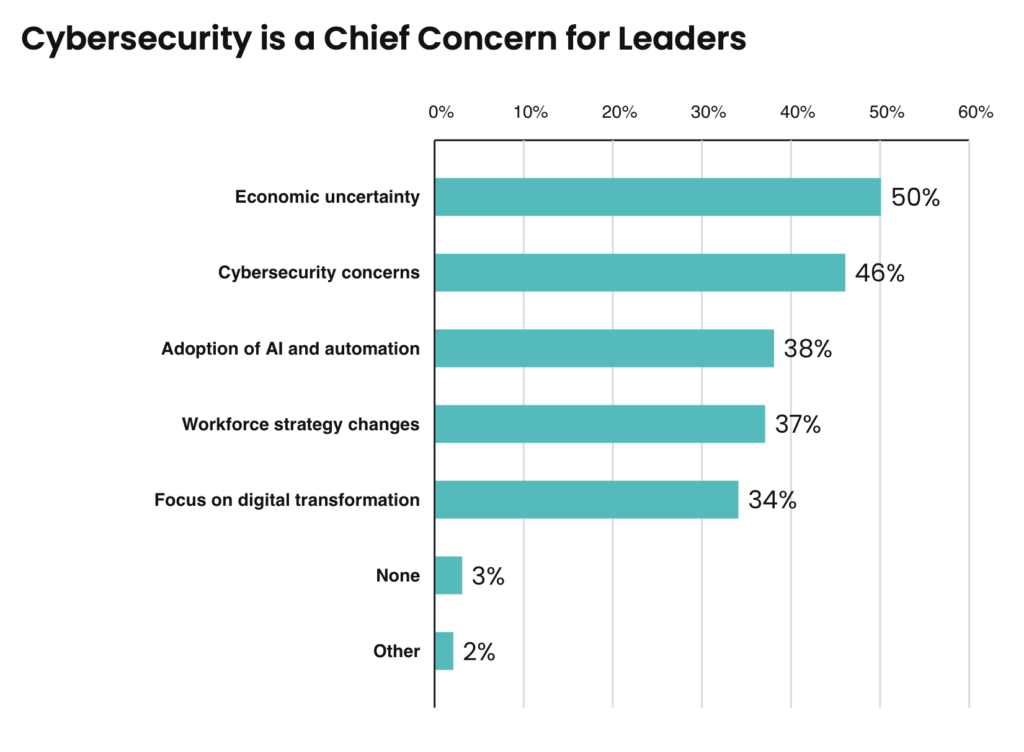November 14, 2024 • 6 Min Read
Healthcare leaders are facing the daunting challenge of balancing innovation and complexity as they steer through the intricate relationship between artificial intelligence (AI), groundbreaking advancements, and data security. While AI presents tremendous opportunities for optimizing operations and improving patient interactions, it also introduces distinct hurdles concerning data privacy and regulatory adherence.
- Healthcare leaders across the board are engaging in a variety of business and technological initiatives to adapt to evolving market dynamics and consumer expectations.
- Broader trends, including regulatory pressures, financial challenges, and advancements in medical treatments and therapies, all play a blended role and have different impacts on each organization.
- Healthcare leaders are being challenged by boards of directors and CEOs to deliver value and diversify operating models at a rapid pace, all amid a backdrop of unprecedented uncertainty.
Sachin Dev, Vice President of RGP Healthcare, offers strategic insights and actionable next steps for healthcare executives to effectively manage these complex and critical areas.
Understanding the Role of AI in Healthcare
The potential of AI to enhance healthcare outcomes is clear, yet it is essential to understand the distinctions between AI and human judgment. AI can analyze extensive datasets without bias, potentially minimizing the prejudices that can accompany human decision-making. Developing systems that augment rather than replace human input can promote collaboration between AI and human professionals—and is vital for maintaining patient trust and adhering to ethical standards in healthcare.
AI undoubtedly offers significant opportunities to revolutionize healthcare. By analyzing large volumes of information, AI algorithms can uncover patterns and insights that might not be readily apparent to human analysts. Currently, AI is poised to make contributions in several areas, including:
- Improving diagnostic accuracy: AI’s ability to analyze imaging data can lead to earlier disease detection.
- Enhancing patient engagement: AI-powered chatbots can provide round-the-clock responses to patient inquiries, thereby increasing patient satisfaction.
- Boosting operational efficiency: Automating administrative tasks can significantly reduce the time spent on paperwork, allowing healthcare professionals to prioritize patient care.
However, to fully leverage these technological advancements while protecting patient data, healthcare leaders need talent with the right training and skills. In RGP’s October 2024 pulse survey, financial decision makers indicated that the biggest talent shortages over the next 12 months will be in cybersecurity, AI and digital transformation.
Healthcare leaders must also implement robust security frameworks and ensure proper governance of AI systems, emphasizing security, compliance, and patient trust.
Data Security and Compliance: A Growing Imperative
Years of digital transformation have gradually and inadvertently resulted in significant technical debt for healthcare organizations across the spectrum (payer, provider and life sciences). Systems such as electronic medical records, revenue cycle systems, clinical decision support tools, financial planning, and clinical enterprise resource planning (ERP) have expanded far beyond their original designs, leading to subpar functionality across the organization.

This has caused significant shortcomings in data sharing, patient experience, and compliance. Repeated efforts to achieve a unified single source of truth have only resulted in the proliferation of numerous data sources, leaving clarity elusive.
AI systems, particularly those that utilize generative models, require access to large datasets, heightening their vulnerability to cyberattacks. Stringent healthcare regulations, such as HIPAA in the United States and GDPR in the European Union, require strong compliance measures. In 2023, the U.S. Department of Health and Human Services (HHS) imposed $28.7 million in fines for HIPAA violations.
Ensuring AI systems meet these regulatory requirements while remaining operationally efficient presents a complex challenge for healthcare leaders.
Gartner predicts that by 2025, 40% of AI-based systems will encounter security threats. To mitigate these risks, healthcare leaders must safeguard their AI models against both internal and external threats, by incorporating security considerations at every phase of AI deployment. By focusing on security and compliance and fostering patient trust, leaders in healthcare can drive impactful innovations that enhance outcomes while protecting privacy.
Consumer Acceptance of AI-Driven Solutions
Patient acceptance of AI in healthcare is on the rise, with 65% of individuals showing a willingness to engage with AI-driven healthcare services (Cleveland Clinic). Healthcare leaders must respond to this growing demand responsibly by fostering transparent communication about how AI technologies are employed, which can help build trust among consumers.
Moreover, adopting a patient-centric design approach — as opposed to implementing out-of-the-box solutions — and involving patients in the creation of AI tools will better align these technologies with their needs and concerns, fostering greater trust.
Fortifying Cybersecurity Strategies
The healthcare sector has become an appealing target for cybercriminals, evidenced by a spike in reported data breaches since 2022. The average cost of a healthcare data breach in 2024 stands at a staggering $9.77 million — more than any other sector in the U.S. (HIPAA Journal). These breaches jeopardize patient safety, disrupt operations, and tarnish the reputations of healthcare organizations.
AI systems, particularly those leveraging intricate algorithms and vast datasets, face unique security challenges. Therefore, it is critical for healthcare leaders to emphasize both the efficacy of AI models and the strength of their security protocols to fully harness AI’s potential in healthcare. This calls for a proactive approach to cybersecurity that integrates seamlessly with AI technologies.
To establish a robust cybersecurity framework, healthcare leaders need to prioritize effective data governance, continuous training for staff, and strategic AI integration to ensure the protection of sensitive patient information.
- Data governance: Creating thorough data governance frameworks is essential, including defining who accesses patient data and how it is stored, and establishing data-sharing protocols.
- Training and awareness: Ongoing training in cybersecurity awareness and data protection should be mandatory for all employees, as they serve as the first line of defense against potential breaches.
- AI in cybersecurity: Utilizing AI solutions to monitor systems for irregular activities can significantly enhance data protection initiatives.
Embracing the Future: The Bigger Picture
Navigating the triad of innovation, AI and data protection in healthcare is a complex endeavor filled with both opportunities and challenges. By acknowledging the importance of human judgment alongside AI advancements, emphasizing data security and engaging patients, healthcare executives can formulate a comprehensive strategy that leads to greater operational efficiency, improved patient outcomes, and trustworthy data practices.
In this era of rapid technological evolution healthcare leaders must diligently uphold their responsibilities, ensuring that innovation aligns with the ultimate objective — providing quality care to patients.
As we move forward, the successful integration of AI and data protection will be a cornerstone in shaping the future of healthcare.
Actionable Next Steps:
-
- Enhance AI governance and ethics: Develop a framework that tackles accountability, bias, and data privacy to steer the application of AI in patient care and healthcare operations. This includes formulating explicit guidelines regarding the use of patient information and weaving ethical considerations into the deployment of AI technologies.
- Increase investment in cybersecurity infrastructure: To address the growing risk of cyber threats, healthcare organizations must upgrade their cybersecurity protocols by incorporating AI-driven solutions capable of identifying and mitigating potential breaches in real-time.
- Create collaborative decision-making models: Encourage cooperation between AI and human decision-making by designing systems that assist rather than replace healthcare professionals, particularly in fields such as diagnostics and personalized medicine.
How is your healthcare organization navigating the challenges of innovation, AI, and data protection? Drop us a line to share your thoughts.
Related Insights

